
| Centre Name: | 
Centre for Internet of Things and Big Data (CIoTBD) (previously known as Centre for Information Systems and Software Technologies (CISST)) |
| Chairperson: | Dr. Ng Hui Fuang |
| Description of Centre: | Centre for Information Systems and Software Technologies (RCISST) aims to provide a focal point of contact for management, cooperation and coordination among UTAR staffs and external parties that seek R&D collaboration and consultancy. The vision of this centre is to become a national and regional centre of excellence in the research areas of information systems and software technologies. |
| Research area: |
The centre has research projects on the following areas of interest:
|
| No | NAME | FACULTY | MEMBER |
|---|---|---|---|
| 1 | Aamir Amin | FICT | Full Membership |
| 2 | Aun Yichiet | FICT | Full Membership |
| 3 | Chai Meei Tyng | FICT | Full Membership |
| 4 | Chan Lee Kwun | FICT | Full Membership |
| 5 | Chang Jing Jing | FICT | Full Membership |
| 6 | Cheng Wai Khuen | FICT | Full Membership |
| 7 | Choo Peng Yin | FICT | Full Membership |
| 8 | Deveendra menon a/l Narayanan Nair | FICT | Full Membership |
| 9 | Gan Ming Lee | FICT | Full Membership |
| 10 | Goh Chuan Meng | FICT | Full Membership |
| 11 | Goh Hock Guan | FICT | Full Membership |
| 12 | Hung Chen Wei | FICT | Full Membership |
| 13 | Jasmina Khaw Yen Min | FICT | Full Membership |
| 14 | Kesavan Krishnan | FICT | Full Membership |
| 15 | Khor Siak Wang | FICT | Full Membership |
| 16 | Ku Chin Soon | FICT | Full Membership |
| 17 | Lai Siew Cheng | FICT | Full Membership |
| 18 | Lee Heng Yew | FICT | Full Membership |
| 19 | Leong Chun Farn | FICT | Full Membership |
| 20 | Leung Kar Hang | FICT | Full Membership |
| 21 | Liew Soung Yue | FICT | Full Membership |
| 22 | Lim Jit Theam | FICT | Full Membership |
| 23 | Ms Mogana a/p Vadiveloo | FICT | Full Membership |
| 24 | Mobashar Rehman | FICT | Full Membership |
| 25 | Mok Kai Ming | FICT | Full Membership |
| 26 | Ng Hui Fuang | FICT | Full Membership |
| 27 | Ng Wan Qing | FICT | Full Membership |
| 28 | Norazira binti A Jalil | FICT | Full Membership |
| 29 | Nur Haliza Binti Abdul Wahab | FICT | Full Membership |
| 30 | Nur Syadhila Binti Che Lah | FICT | Full Membership |
| 31 | Ooi Boon Yaik | FICT | Full Membership |
| 32 | Ooi Joo On | FICT | Full Membership |
| 33 | Phan Koo Yuen | FICT | Full Membership |
| 34 | Ramesh Kumar Ayyasamy | FICT | Full Membership |
| 35 | Rehan Akbar | FICT | Full Membership |
| 36 | Robithoh Annur | FICT | Full Membership |
| 37 | Sarerusaenye Binti Ismail | FICT | Full Membership |
| 38 | Saw Seow Hui | FICT | Full Membership |
| 39 | Sayed Ahmad Zikri Bin Sayed Aluwee | FICT | Full Membership |
| 40 | Soong Hoong Cheng | FICT | Full Membership |
| 41 | Su Lee Seng | FICT | Full Membership |
| 42 | Sun Teik Heng @ San Teik Heng | FICT | Full Membership |
| 43 | Syed Muhammad Bin Syed Omar | FICT | Full Membership |
| 44 | Mr Tan Chiang Kang @ Thang Chiang Kang | FICT | Full Membership |
| 45 | Tan Hung Khoon | FICT | Full Membership |
| 46 | Tan Joi San | FICT | Full Membership |
| 47 | Tan Lyk Yin | FICT | Full Membership |
| 48 | Tan Teik Boon | FICT | Full Membership |
| 49 | Teoh Shen Khang | FICT | Full Membership |
| 50 | Tey Chee Chieh | FICT | Full Membership |
| 51 | Tou Jing Yi | FICT | Full Membership |
| 52 | Tse Siu Hong Savio | FICT | Full Membership |
| 53 | Vasaki a/p Ponnusamy | FICT | Full Membership |
| 54 | Wong Chee Siang | FICT | Full Membership |
| 55 | Yap Seok Gee | FICT | Full Membership |
| No. | Date | Type | Event |
|---|---|---|---|
| 1 | 14-Jan-19 | Seminar Talk | Vehicle Firmware Download Over The Air Technology for the Connected Car |
| 2 | 15-Jan-19 | Seminar Talk | Autonomous Car Research |
| 3 | 20-Feb-19 | Seminar Talk | 1. Introduction to ROS 2. Internship Experience in Kyutech |
| 4 | 18-Mar-19 | Forum | Surveillance system for ATM machine |
| 5 | 25-Mar-19 | Forum | AI, Deep Learning & How it shapes the world |
| 6 | 16-May-19 | Colloquium | Postgraduate Colloquium May 2019 |
| 7 | 28-May-19 | Workshop | Blockchain Fundamentals |
| 8 | 31-May-19 | Workshop | Mini ROS Workshop |
| 9 | 19-Jun-19 | Forum | Course Map and Research Areas/Topics in Computer Science & Information Engineering at NCKU, Taiwan |
| 10 | 17-Jul-19 | Seminar | The Human Factor in Software Engineering and its Significance |
| 11 | 26-Jul-19 | Forum | An Autonomous Vein Detection System using Deep Learning |
| 12 | 22-Aug-19 | Workshop | RoboCup@Home |
| 13 | 17-Oct-19 | Forum | Introduction to OpenVINO--Computer Vision Toolkit |
| 14 | 8-Nov-19 | Forum | UTAR & UMN (Universitas Multimedia Nusantara) Bilateral Symposium |
| 15 | 15-Dec-19 | Workshop | Train The Hacker 2019 |
| No. | Date | |
|---|---|---|
| 1 | Vehicle Firmware Download Over The Air Technology for the Connected Car Date: 14 January 2019 Time: 3:30pm – 5:00pm Event Type: Seminar Talk Venue: N108, Block N, FICT, UTAR (Kampar Campus) Speaker: Prof. Sung Kwon Park #Participants: 20 Recent vehicles are equipped with so many ECUs (Electronic Control Unit) such as engines, brakes, LIDARs, and RADARs to name a few. Some advanced vehicles are equipped with more than 100 ECUs in a vehicle. These ECUs have their own firmwares almost without exceptions. As applications in a smart phone need so frequent upgrades, these firmwares also need upgrades after vehicles are sold in the market. Currently, these firmwares are updated through the wired CAN (Controller Area Network) network protocol in vehicle service stations. The firmware download speed is as slow as a few 100 Kbps. For example, it took almost 30 minutes for the firmware for my wireless car key of my own to be upgraded in a vehicle service station in this spring. Currently the presenter is involved with a research to do the upgrade over the LTE (Long Term Evolution) mobile phone network with the speed as fast as 8 Mbps. We call this firmware upgrade as firmware upgrade OTA (Over The Air). So firmwares in a vehicle parked in a parking garage can be upgraded efficiently and conveniently. In this seminar talk, Prof. SungKwon Park discussed the current research efforts toward these technologies involved in OTA. |
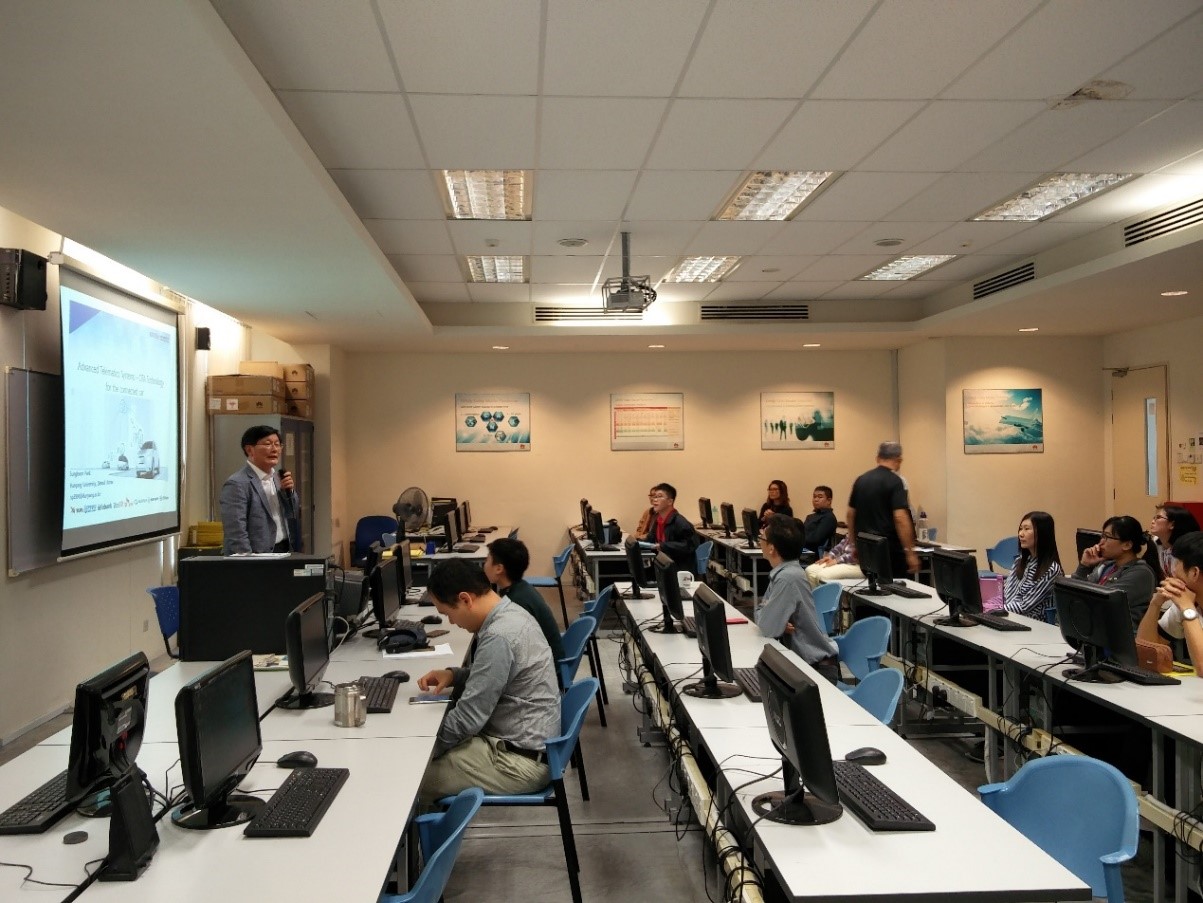
|
| 2 | Autonomous Car Research Date: 15 January 2019 Time: 10:30 am – 12:00pm Event Type: Seminar Talk Venue: N108, Block N, FICT, UTAR (Kampar Campus) Speaker: Prof. SungKwon Park #Participants: 17 In this talk, Prof. SungKwon Park introduced recent activities of international standardization toward autonomous vehicles. Currently, ISO and SAE as international standardization organizations are actively involved in these standardization activities. Especially ISO TC204 and TC22 SC31 are most active in the area. Also, almost independently with these, IEEE and SAE (Societies of Automotive Engineers) in the USA are producing various standards as well in the same area. As these activities are studied, we can trace through the international research and development movements in the autonomous vehicle. The presenter of this talk overviewed the activities of these organizations because in the past several years, he has been involved in these standardization activities as a Korea delegate. |

|
| 3 | (a) Introduction to ROS Date: 20 February 2019 Time: 10:00 am - 11:30 am Event Type: Seminar Talk Venue: N109, Block N, FICT, UTAR (Kampar Campus) Speaker: Mr. Danny Ng Wee Kiat #Participants: 9 Mr. Danny gave a short introduction to ROS in this seminar talk. The architecture of the ROS and how it works to facilitate development were shared. One example where a simple wheel robot that is developed by a team of students in Sg Long campus was shared during the presentation. |
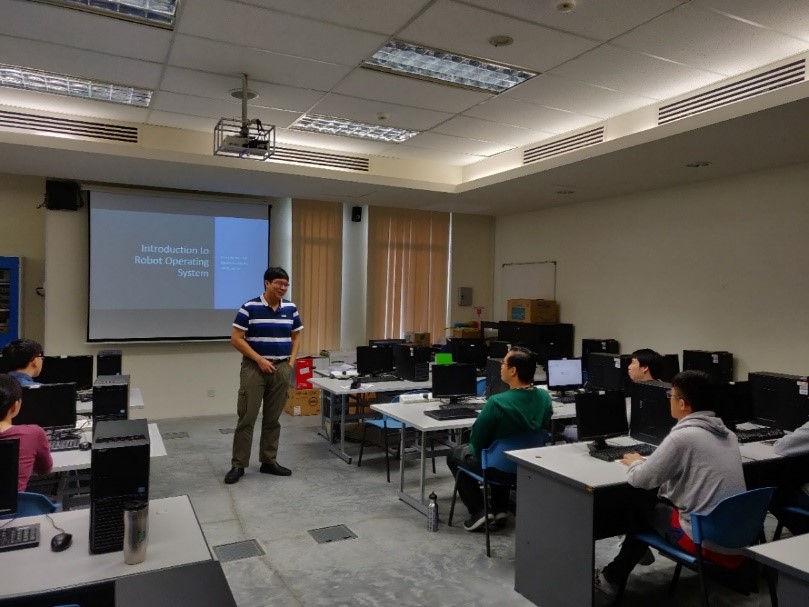
|
| (b) Internship Experience in Kyutech Date: 20 February 2019 Time: 10:00 am - 11:30 am Event Type: Seminar Talk Venue: N109, Block N, FICT, UTAR (Kampar Campus) Speaker: Mr. Yong Cherng Liin #Participants:9 Mr. Yong gave a brief introduction to the Kyushu Institute of Technology and Toyota Human Support Robot (HSR). After that, the details on the project conducted within these 3 months internship were discussed. |
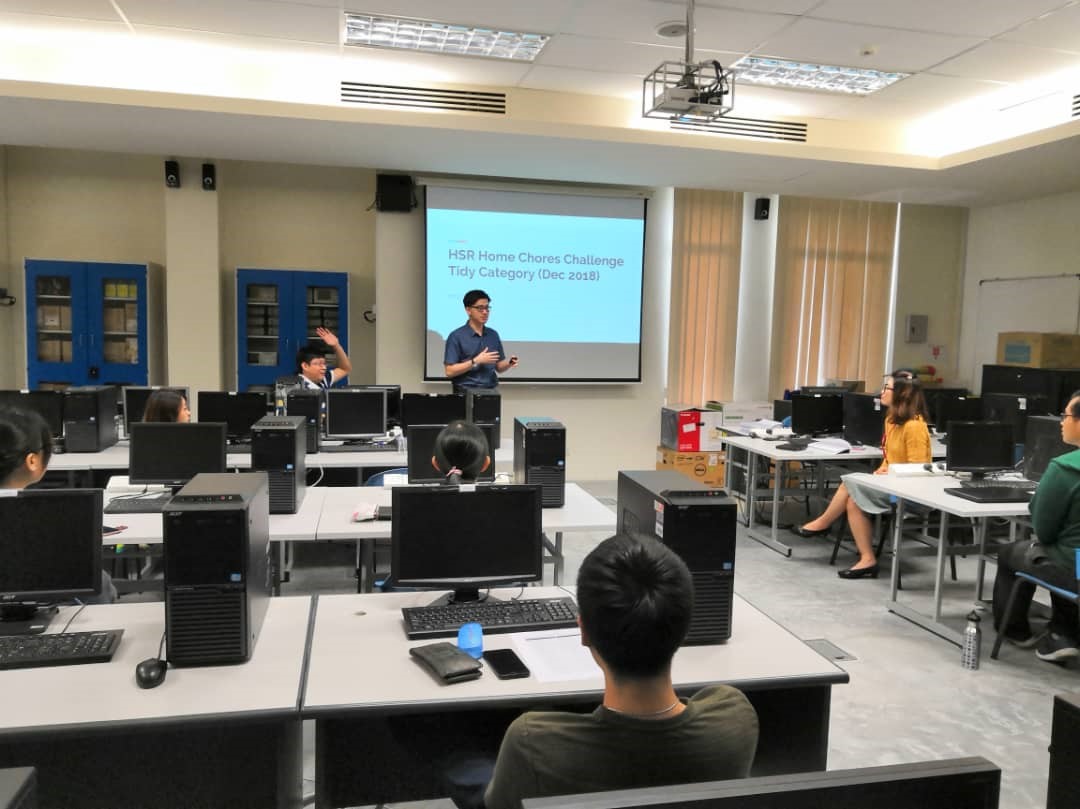
| |
| 4 | Surveillance system for ATM machine Date: 18 March 2019 Time: 11:00 am - 12:00 pm Event Type: Forum Venue: N109, Block N, FICT, UTAR (Kampar Campus) Speaker: Dr Lee Wai Kong #Participants: 8 Automated Teller Machine (ATM) offers great convenience to many people by allowing quick bank transactions and cash withdrawal. However, ATM machines are also vulnerable to attacks when they are unattended during non-office hours and public holidays. Recently, many ATM machines were reported being removed from the premises or damaged using various methods in order to steal the cash inside. Due to this reason, many ATM sites are actually equipped with video surveillance systems to monitor the environment for crime prevention. However, it is difficult for security personnel to pin-point the crime scene in real time when the number of surveillance cameras increases. In this talk, we present a real time security expert video surveillance system was proposed to detect the suspicious behaviour by utilizing image processing techniques. The proposed expert system, is capable in detecting suspicious behaviours that attempt to remove or attack the ATM machines and provide early warning to the centralized video surveillance system. The suspicious behaviour that ArchCam detects include squatting/climbing (attempt to remove security alarm system or place a bomb) and carrying "belt shape" object (attempt to remove the ATM). With the intelligence of detecting suspicious behaviour, the proposed expert system can effectively alert the security personnel to take proactive actions before the cash is being robbed from the ATM machines. This is a consultancy project completed by Leong Chun Farn and Lee Wai Kong in early 2017, together with a team from Archtron R&D Sdn. Bhd. (a company developing security solution to household, bank and factory). |
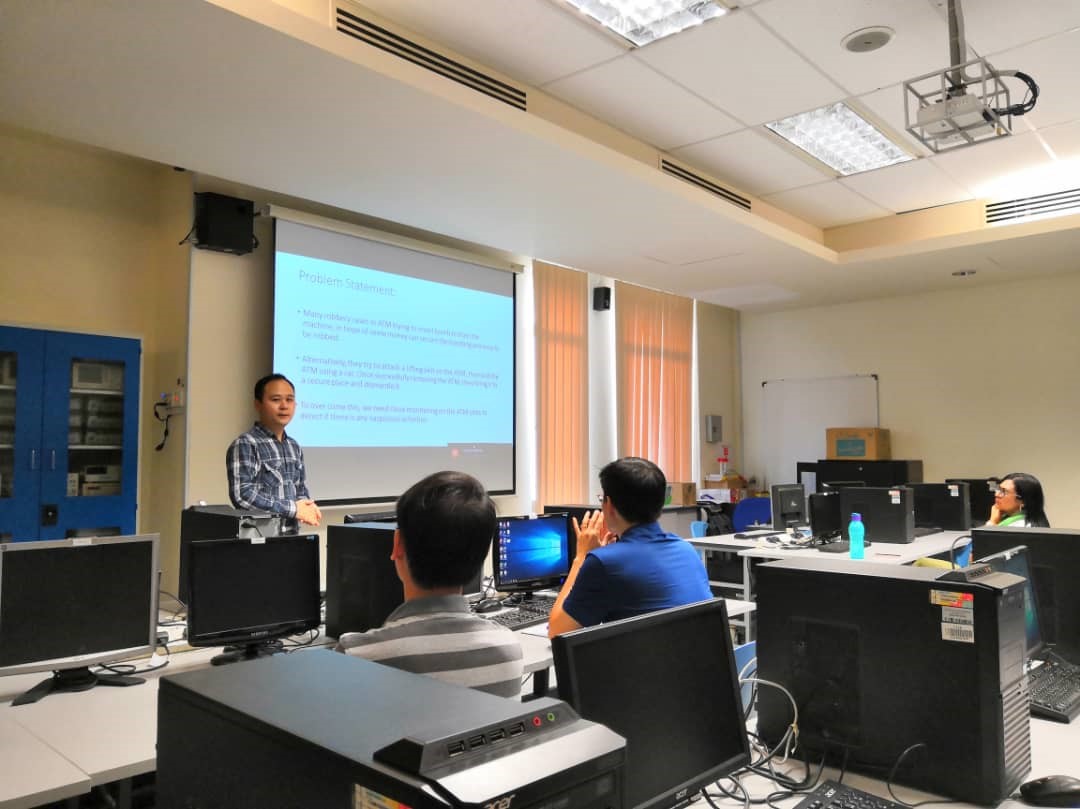
|
| 5 | AI, Deep Learning & How it shapes the world Date: 25 March 2019 Time: 1:00 pm - 2:00 pm Event Type: Forum Venue: NF006, Block N, FICT, UTAR (Kampar Campus) Speaker: Mr Choon Kiat Tay #Participants: 13 A.I. is one of the most important element in Industry 4.0. In this forum, Mr Choon talked on how A.I. improves human civilization while challenging human intelligence and what our generation can do to stay competent with robot. |
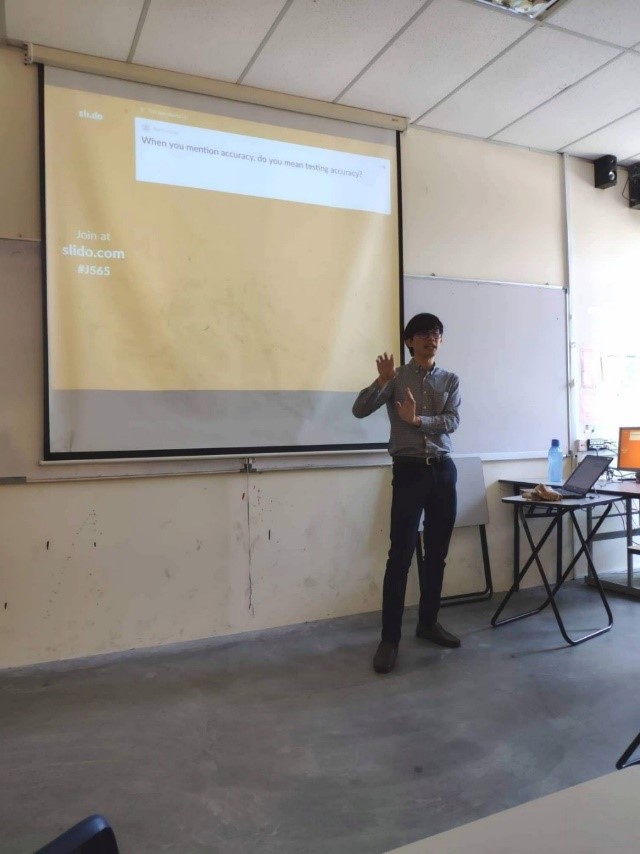
|
| 6 | Postgraduate Colloquium May 2019 Date: 16 May 2019 Time: 8:30 am - 5:30 pm Event Type: The FICT Postgraduate Colloquium Venue: N108 & N109, Block N, FICT, UTAR (Kampar Campus) Keynote Speaker I: Ir. Dr. Chuah Joon Huang Keynote Speaker II: Dr. Lin, Chih-Yang Speakers: Postgraduates Presentations #Participants: 36 CISST and FICT have organized FICT Colloquium of the year on 16th May, 2019. In this colloquium, all postgraduate students (both Master and PhD students) presented their recent work or findings in their field of research. This activity provides a chance to all postgraduate students of FICT to exchange ideas and gather feedback on their research progress and findings. Through this interaction, students will gain exposure on different fields of research undertaken by students in the faculty. It also serves as a platform for supervisors and evaluators to gauge the performance of postgraduate students before submitting the research progress report. The May FICT Colloquium has two parallel tracks. There were a total of 13 postgraduate presentations, grouped into 4 sessions, namely Algorithms and Modeling, Knowledge Management and Software Engineering, IoT and Hardware Integration, and Security, Image Processing & Computer Vision. Each student delivered a 15-to-20-minute presentation, followed by 10 to 15 minutes of Q&A. |
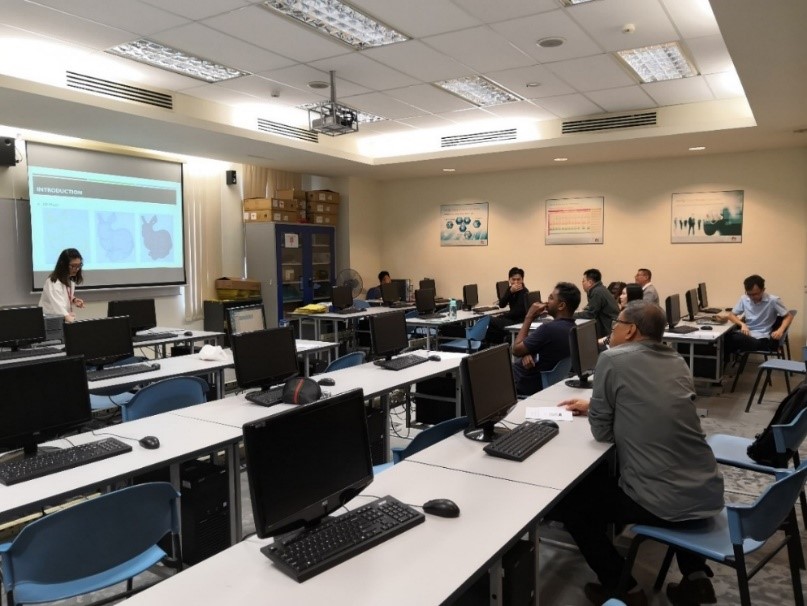
|
| 7 | Blockchain Workshop Date: 28 March 2019 Time: 9:00 am - 5:00 pm Event Type: Workshop Venue: NF006, Block N, FICT, UTAR (Kampar Campus) Speaker: Dr. Mazoor Hashmani #Participants: 39 This course is designed to expose the participants with the basic understanding of the Blockchain and its application areas. It also covers the technical areas of building your own chain, smart contract development using entereum via practical demonstration. As the end, the future directions of the blockchain arena is also discussed. |
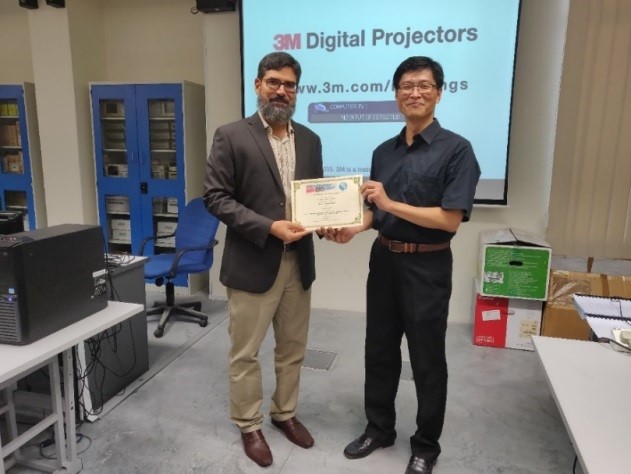
|
| 8 | Mini ROS Workshop Date: 31 May 2019 Time: 1:00 pm - 5:00 pm Event Type: Workshop Venue: N109, Block N, FICT, UTAR (Kampar Campus) Speaker: Mr. Teoh Shen Khang #participants: 12 In this talk, Prof. SungKwon Park introduced recent activities of international standardization toward autonomous vehicles. Currently, ISO and SAE as international standardization organizations are actively involved in these standardization activities. Especially ISO TC204 and TC22 SC31 are most active in the area. Also, almost independently with these, IEEE and SAE (Societies of Automotive Engineers) in the USA are producing various standards as well in the same area. As these activities are studied, we can trace through the international research and development movements in the autonomous vehicle. The presenter of this talk overviewed the activities of these organizations because in the past several years, he has been involved in these standardization activities as a Korea delegate. |
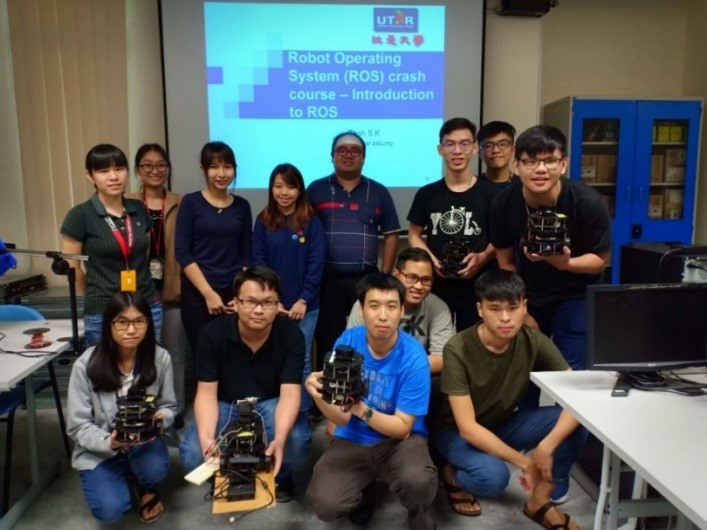
|
| 9 | Course Map and Research Areas/Topics in Computer Science & Information Engineering at NCKU, Taiwan. Date: 19 June 2019 Time: 11:30 pm - 12:30 pm Event Type: Forum Venue: N109, Block N, FICT, UTAR (Kampar Campus) Speaker: Prof Kao, Hung-Yu #participants: 12 |
|
| 10 | The Human Factor in Software Engineering and its Significance Date: 26 July 2019 Time: 11:30 am - 12:30 am Event Type: Forum Venue: N109, Block N, FICT, UTAR (Kampar Campus) Speaker: Professor Luiz Fernando Capretz #Participants: 15 Research in software engineering has been influenced by a myriad of concepts from other field such as mathematics, artificial intelligence, psychology, etc. Borrowing ideas from other areas can help software engineers tackle some outstanding problems that take place during software development, which is often referred as “software crisis”. This talk will focus on many facets, they are: (a) the combination of neuro-fuzzy concepts with algorithmic models to solve the challenging problem of software estimation; (b) the importance of human aspects in software development; (c) software team composition; (d) and the unpopularity of software testing among software engineers. Professor Luiz intended to encourage the audience to “think outside the box” and divert from mainstream research in software engineering. |
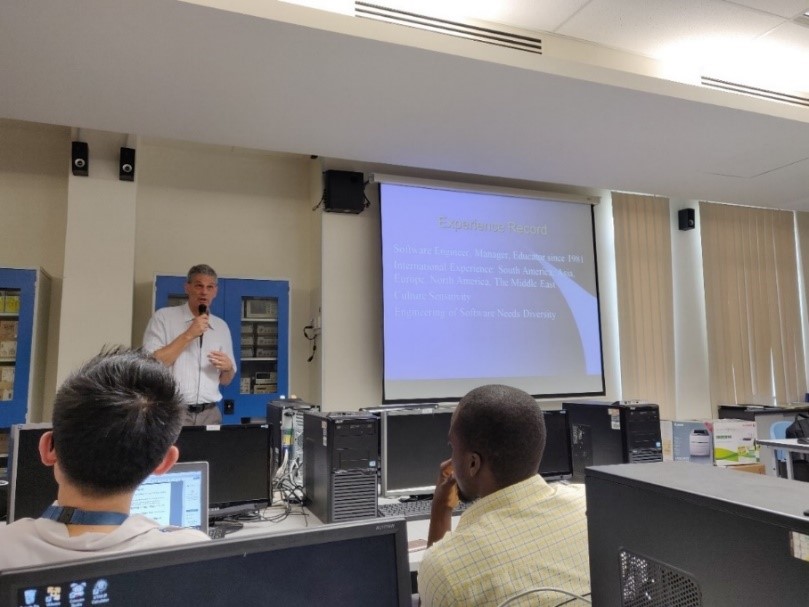
|
| 11 | An Autonomous Vein Detection System using Deep Learning Date: 4 July 2019 Time: 11:00am – 12:00pm Event Type: Forum Venue: NF109, Block N, FICT, UTAR (Perak Campus) Speaker: Dr. Goh Chuan Meng #Participants: 8 Venipuncture is one of the fundamental procedures for most of the patients who are admitted to Hospital. Multiple Intravenous (IV) attempts that are caused by the difficulties in locating the subcutaneous vein, known as Peripheral Difficult Venous Access (PDVA); lead to the discomforts and injuries for patients. Therefore, various proposals of vein localization devices and system using different approaches are reported to overcome such problem and minimize the number attempts of IV. Those proposals had demonstrated the efficiency in reducing the number of venipuncture attempts, but it doesn’t improve the venipuncture procedure due to the lack of vein depth information. In this situation, clinician have no clues for the deep insertion of a needle stick. This is an indication that, the IV access in many cases remains dependent on skill or experience of the clinicians, and thus the problem of inaccurate IV insertion such as infiltration or extravasation will continue to exist. Based on the problem statement, this research proposed a subcutaneous vein depth measurement system and a vein localization device that capable of guiding an accurate venipuncture. This system prototype utilized the multispectral imaging and diffuse reflectance in measuring the vein depth and its efficiency is validated through experimentation and performance analysis in comparison to ground truth (Ultrasound imaging). As mentioned in the previous section, vein depth data rather than localization is more vital when attempting to minimize mis-puncture rates for IV access and will, in a near future, be necessary for autonomous/robotics venipuncture. The next important part in this research is to attain a best segmented vein image to localize the vein’s position accurately such that the true positive candidate of vein pixel is not wrongly detected. Hence, it is important and necessary to propose an optimum NIR vein segmentation system to minimize mis-puncture rates for IV access. However, in a near future, an autonomous venipuncture robot will be introduced and so the automatically vein segmentation system is required to be implemented too. Thus, the optimum filter might not enough for an autonomous IV machine. Therefore, we are proposing deep learning technique to automatically detect the vein pixel from NIR image. Deep learning is the newest form of machine learning and it is the key innovation behind driverless vehicles, a modifiable framework for deep learning algorithms and a collection of reference models to achieve state of the art classification results. |

|
| 12 | RoboCup@Home Date: 22 Aug, 2019 Time: 2:00pm – 6:00pm Event Type: Workshop Venue: N107, Block N, FICT, UTAR (Kampar Campus) Speaker: Jeffrey Too Chuan TAN #Participants: 24 The main objective of this workshop is to introduce the open robot platforms for service robot through RoboCup@Home Education initiative. RoboCup@Home Education is an educational initiative in RoboCup@Home that promotes educational efforts to boost RoboCup@Home participation and service robot development. The trainer will demonstrate the open source and affordable reference robot platform with the basic robot functionalities such as autonomous navigation, voice interaction and visual perception during the workshop. The open source online resources for robotics education will be provided during the workshop as well. This is to encourage and provide support to the participants who are interested to involve in service robot development. |
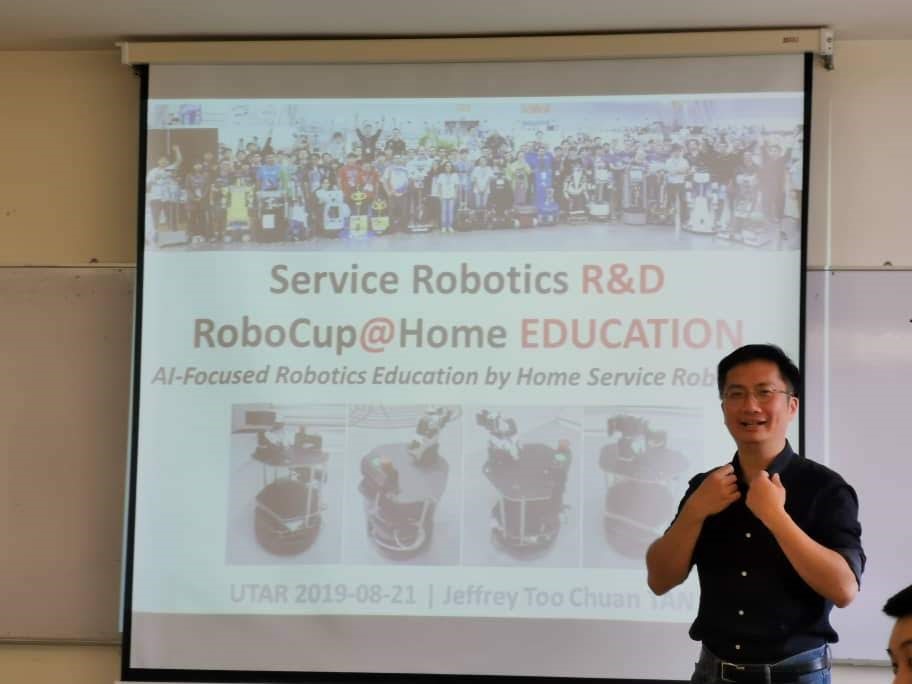
|
| 13 | Introduction to OpenVINO—Computer Vision Toolkit Date: 17 October 2019 Time: 4:00pm – 5:00pm Event Type: Workshop v Venue: N109, Block N, FICT, UTAR (Kampar Campus) Speaker: Dr. Chang Jing Jing #Participants: 29 The demand for vision-based intelligence is growing. This requires developers to integrate computer vision, deep learning, and analytics processing capabilities into applications. However, delivering distributed and end-to-endintelligence is challenging because deep learning training and inference are essentially very different domains. The Intel’s OpenVINO(OpenVisualInferenceandNeuralNetworkOptimization) toolkit is designed to fast-track development of high-performance computer vision and deep learning into vision applications. This toolkit would help developers in optimizing AI-integrated computer vision applications and scaling distributed vision applications without the need to completely redesign the solution for deployment purpose. OpenVINO supports popular open source frameworks like OpenCV, Caffe and TensorFlow. It supports and works with Intel’s traditional CPUs, AI chips, field programmable gate array (FPGA) chips and Movidius Neural Compute Stick(NCS2). |

|
| 14 | UTAR & UMN Bilateral Symposium Date: 8 November 2019 Time: 9:00am – 12:00pm Event Type: Symposium Venue: N109, Block N, FICT, UTAR (Kampar Campus) Speaker: Mr. Arya Wicaksana, Dr. Tan Hung Khoon, Ms. Nunik Afriliana, Dr. Vasaki, Dr. Lee Chen Kang, Mr. Dareen Kusuma Halim #Participants: 30 It is a line-up of talks on quantum computing, A.I. in disease classification, intelligent transport system and blended learning. |

|
| 15 | Train The Hacker 2019 Date: 15 November 2019 Time: 10:00am – 12:00pm Event Type: Workshop Venue: N109, Block N, FICT, UTAR (Kampar Campus) Speaker: Dr. Aun Yichiet #Participants: 39 Students are trained how to crack some capture the flag. |
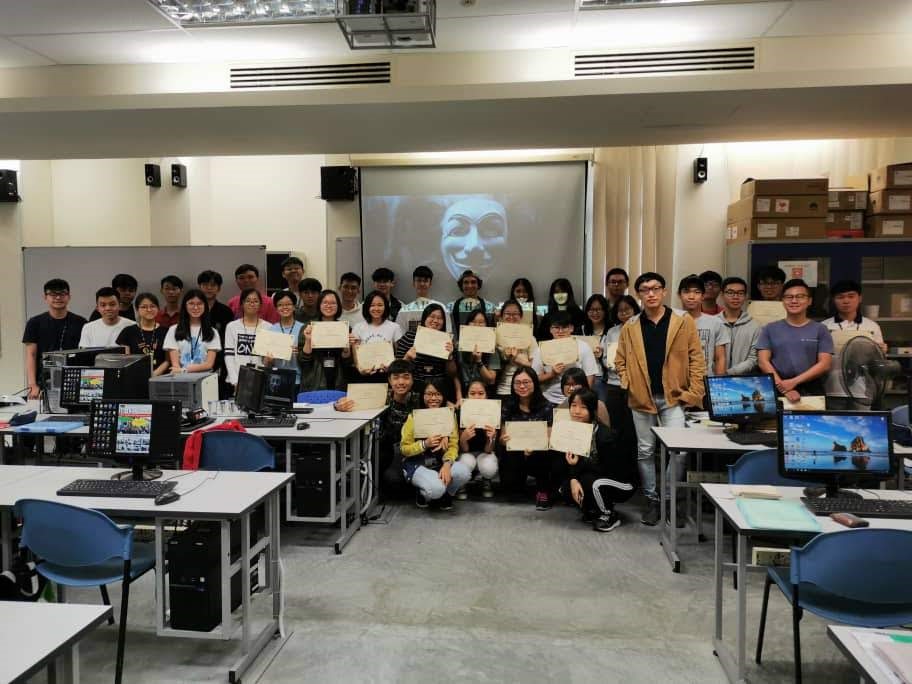
|